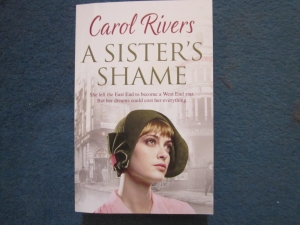Has this ever happened to you as a reader? Recently I read in a novel with a powerful plot and well-drawn characters. I was absorbed, loving every single moment.... and then the main character did something stupid. Something that no reasonable person would have done in that situation; something that was bound to go wrong; something that frankly she was too intelligent to do.... But she did it, because, had she done the sensible thing, it would have cut off an important plot-strand.
I hate plot-driven moments. They spoil a book. In order to be compelling and credible, a plot has be driven along by character. As soon as a character is forced to do something because it suits the mechanics of the plot, the book loses not only its impact but also its credibility. In the case of the book I am talking about, it was brought home to me even more forcefully because I had just re-read A Sister's Shame by saga-writer Carol Rivers.
|
In A Sister's Shame, the drama is driven along by the various characters - their personalities, their dreams, their strengths and weaknesses. All the characters, including the those with apparently minor parts to play, have their own effect on the plot, especially the gentle, honourable Wippet.
|  |
The strength of the characterisation adds depth to the various relationships depicted, especially the romances of the book's two leading ladies, twins Marie and Vesta. Their relationships are central to the unfolding of the action, as one of them finds stability and lasting love while the other rushes headlong into what she thinks is true romance, only to find herself being ruthlessly controlled.
|
 | The wonderful Letting in Light by Emma Davies is another novel which is entirely character-driven. It is a book which conducts a deep exploration of the characters and their emotional truths, whether they want to face up to those truths or not, and immerses the reader in emotion as friends old and new band together to work on creating a community project. |
| What do you think? Would a plot-driven moment spoil a book for you? Who are your favourite characters? And which authors do you trust to deliver a great read every time? Do leave a comment and let me know. |


Make A Comment
Comments (10)
Authors I trust to deliver a great read (albeit from very different perspectives) include Kristan Higgins, Julie Cohen and Karen White.